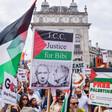Rights and Accountability 26 April 2019

Depleted pharmaceutical stocks at Gaza’s health ministry in May 2017.
APA imagesThe Trump administration in Washington isn’t exactly known for nuance or paying keen attention to the fine details of policy and history.
But an op-ed by Trump’s Middle East envoy Jason Greenblatt in The New York Times this week is remarkable in its bias and baselessness, even by this administration’s “alternative facts” standards.
It was promoted on the White House’s Twitter feed:
In his op-ed, Greenblatt blames Hamas alone for the dire socioeconomic and humanitarian situation in Gaza, repeating the lie that Hamas initiated the last three major Israeli assaults on the territory.He states that the rebuilding of infrastructure destroyed during those wars is “set back years every time Hamas and other terrorist organizations fire rockets into Israel.”
He claims that Palestinians in Gaza would enjoy the progress and stability of their counterparts in the West Bank, where Hamas’ rival, the Fatah-dominated Palestinian Authority oversees internal affairs.
“Grim” prospects
But as recent reporting on the Palestinian economy shows, the West Bank only looks good when compared to the extreme situation in Gaza.
The economy in the West Bank and Gaza has been on a declining trajectory, with growth of less than one percent in 2018, according to the World Bank.
“Given that population growth in the Palestinian territories is around three percent, 2018 registered a sizable decline in the real income of Palestinians, resulting in worsening conditions,” the institution states.
While Gaza experienced a second consecutive year of deep recession in 2018, the West Bank economy significantly slowed.
“Prospects for the Palestinian people are grim,” according to the World Bank.
So-called Area C – the 60 percent of the West Bank that is under full Israeli military control – is off-limits to Palestinians. The World Bank states that Israeli restrictions in Area C and the blockade on Gaza “represent the biggest challenges to growth, and their removal can generate momentous economic benefits.”
In its report, the World Bank describes in detail the complete control Israel has over the Palestinian economy. Its import restrictions have brought Gaza’s manufacturing sector to a halt and driven up costs for West Bank producers, making them unable to compete with Israeli products.
Israel imposes those restrictions under the guise of security, stating that “dual use” items may have military applications.
It enforces controls additional to those set out in international treaties, with some so broad as to include “communications equipment, communications supporting equipment, equipment containing communication functions.”
This broad definition, the World Bank states, “affects most civilian production lines and spare parts, most medical equipment, and most home appliances.”
Palestinians are unable to expand production and modernize, creating “a large technological gap with neighboring countries.”
The inability to import spare parts to Gaza, the World Bank says, means that “a single broken ball bearing can put the entire production line out of commission, forcing manufacturers to shut down production or cannibalize other production lines for parts.”
Control
Though imposed in the name of security, the control over the Palestinian economy was surely Israel’s intention all along. The World Bank demurely states that “the non-transparent use of dual use lists … can be perceived as non-tariff barriers.”
Gaza traders told the organization that “nearly any item can be deemed dual use at the entry to the Strip, even if it has been imported previously by the same importer with no special controls.”
Access to “dual use” items requires authorization by COGAT, the bureaucratic arm of Israel’s military occupation: “a long, non-transparent and unpredictable bureaucratic process.”
West Bank producers are able to access some “dual use” items through Israeli middlemen who bring the goods in via military checkpoints, “which defeats the law’s declared security purpose,” the World Bank states.
But it does drive up costs for West Bank businesses, and therefore prices for Palestinian consumers. A dairy manufacturer in the West Bank, for example, reported that Palestinian producers yield a maximum eight percent profit margin, versus 25-30 percent for Israeli producers.
The World Bank points at Israel, rather than rockets from Gaza, for years-long delays of critical public infrastructure projects in the territory.
A wastewater treatment plant funded by the World Bank “suffered delays of at least four years related to approvals for entry and delivery” of goods by Israel, increasing costs by $1.6 million.
Permission for a wheel loader for that project was submitted to Israel in 2012, approved in 2015, but delivered only in 2018.
Meanwhile pharmaceutical companies in Gaza, which is subjected to additional import controls than the West Bank, cannot get basic ingredients like “glycerin, hydrogen peroxide or any compound that contains nitrates.” The pharmaceutical industry in the territory is operating at only half of its pre-blockade level, and half of all essential medicines are currently at zero stock level.
The World Bank is no champion of Palestinian liberation and self-determination. Not for the first time, its report doesn’t once use the phrase military occupation, referring only to Israeli “restrictions.”
It essentially recommends reforming Israel’s economic control over millions of Palestinians, rather than removing it altogether.
But it states plainly that “Israeli constraints on movement, access and trade continue to be the main impediment to economic growth in the Palestinian territories” – not Greenblatt’s Hamas bogeyman.
The extent of Israel’s control was shocking even to this longtime observer, with the World Bank noting that the ban on metal pipes and plastic sheets means that any Gaza greenhouse destroyed during an Israeli attack results in a “permanent loss of productivity for the affected farmers.”
Now imagine if Israel, armed and afforded diplomatic cover by the US, would choose peace rather than economic warfare against a captive civilian population.






Comments
Now imagine if Israel ...would choose peace rather than...warfar
Permalink Lidia replied on
Yeah, imagine if an apartheid colonizer would choose to stop being an apartheid colonizer...
agreed
Permalink yup replied on
yup, well said sis.